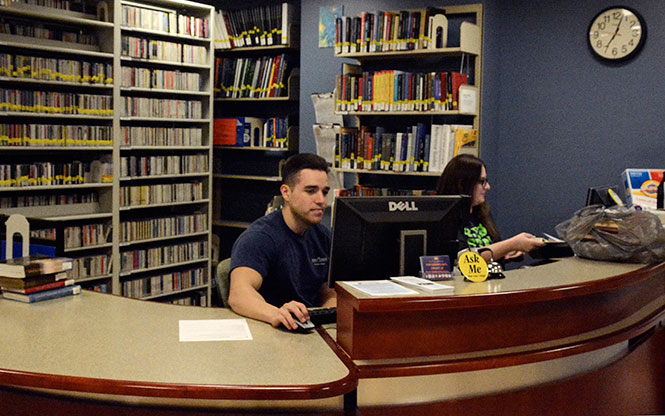Subject librarians assist students with research
Patrick Markovich (left) and Sarah Holmes (right) work at the Performing Arts Library Tuesday, April 29, 2014. Markovich has been working at the library for the past year and Holmes has been a part of the team for eight months. The two are available at the desk to help answer any questions regarding the library.
University Libraries has 20 workers who specialize in serving as resources to help students, faculty and staff with research and gathering information. These university employees are called subject librarians.
Head of Reference Services Kara Robinson has been a subject librarian for 24 years and said the subject librarians can take on more than one academic department.
“The subject librarians are individuals who are designated to work with specific programs or departments,” Robinson said. “There are a number of us who have multiple departments or some of us who may appear to only have one assignment but could have multiple units within it.”
Robinson is the subject librarian for six departments on campus, including history, law, criminology and justice studies, political science and Pan-African studies.
Vanessa Earp, subject librarian for the College of Education, Health and Human Services, said becoming a subject librarian does not require specific years of training, but attending graduate school with a degree in library science is the first step.
“There’s no real official training to be a subject librarian, but you definitely need your degree in library science,” she said.
Subject librarians are not limited to helping students only in their academic departments, said Jasmine Jefferson, an assistant professor at University Libraries.
“Although all of the subject librarians have their own academic departments that they are responsible for, the librarians will help all students, even if they are outside of their academic department,” she said.
Jefferson, who has been a subject librarian for two years, said she feels that subject librarians play a significant role in helping students gain a sense of comfort with University Libraries and their services.
Because Jefferson is the undeclared majors subject librarian, she is also the First Year Experience librarian, a unit within the academic department.
“I remember what it felt like being a freshman and coming into the University Library; I was afraid that no one was going to answer my questions,” she said. “As a subject librarian, I really feel the support and connection with the freshmen students because I just want to make their life easier.”
Ken Burhanna, assistant dean for Engagement and Outreach for University Libraries, currently acts as the interim physics and chemistry subject librarian. He said serving as the First Year Experience subject librarian had the biggest impact on him.
“The First Year Experience librarian is an interesting role because in a way, you’re the library for the freshmen and new students,” he said. “It’s like you’re the subject librarian for all of the first-year students, and it’s taught me that you really have to be there for these students.”
Robinson said a librarian’s knowledge about a specific academic department isn’t always important.
“A lot of what we do doesn’t require [having] to have a lot of in-depth knowledge of the field per se,” Robinson said. “It’s the sources; we know how to help people find the sources they need and navigate through those sources.”
Jefferson said helping students find something they’re looking for is rewarding.
“We subject librarians are a gateway of knowledge to these students,” she said. “I think it’s important that we make that connection, especially with students in the beginning of their college career, so when they know that they want to study psychology, they can come in and introduce themselves to the psychology librarian.”
Earp, the College of Education, Health and Human Services librarian, said her favorite part of her career is watching students she has connected with grow and mature throughout their college careers.
“One of the things that I’ve noticed is that once you build that relationship with the student, they come back,” she said. “You see them all throughout their academic career and when you see them at graduation, it is an excellent feeling.”
Contact Christopher Woods at [email protected].



